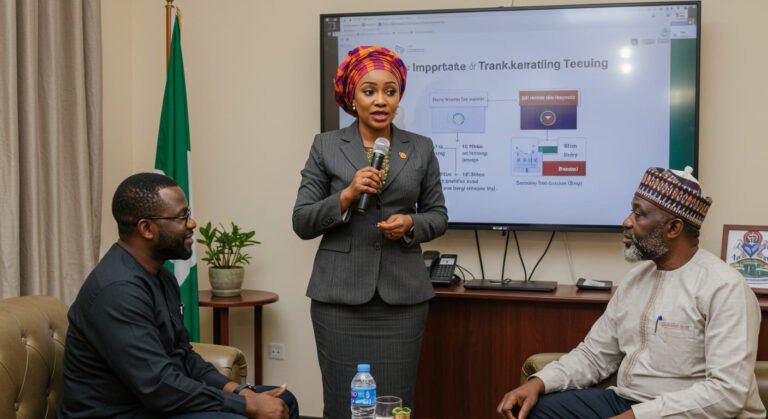Are you looking for how to obtain NIMASA license in Nigeria for shipping companies and agents? This 2025 guide explains the full application process, requirements, costs, and tips for Lagos, Port Harcourt, and nationwide applicants.
The NIMASA shipping license is a mandatory license issued by the Nigerian Maritime Administration and Safety Agency (NIMASA) for shipping companies and agents who intend to operate in the maritime sector. This license serves as the legal framework governing shipping in Nigeria.
Obtaining a NIMASA license ensures your business operates within the regulatory standards established by the agency, which aims to improve metering efficiency and reliability in Nigeria’s maritime sector. In this article, we will cover everything your business needs to be able to successfully obtain this license.
If you plan to do business in Nigeria’s shipping or maritime industry, one thing is non-negotiable: you will need to obtain an operational license from NIMASA. It doesn’t matter your specific operations — whether you’re importing vessels, running offshore logistics, or offering crewing and support services — compliance with the Nigerian Maritime Administration and Safety Agency (NIMASA) is mandatory if you want to operate legally and access contracts from oil companies, international shipping lines, or government bodies.
This article is the guide you need, as it breaks down everything you need to know about obtaining a NIMASA shipping license — requirements, processes, costs, and how to avoid costly delays.
Why you need a NIMASA shipping license
NIMASA regulates shipping activities within Nigerian waters, ensuring safety, environmental protection, and compliance with international maritime conventions. If you operate without a proper license, you put your business at risk of vessel seizure or port detention, legal penalties and fines, ineligibility for oil and gas or government contracts, and reputational damage.
With Nigeria’s strategic coastline and increasing demand for maritime services, it is strategic to acquire a license — not just for legality but for positioning your business to grow and win major contracts.
Who needs a NIMASA shipping license?
You need a license from NIMASA if your business falls under any of the following:
- Shipping companies and agents operating in Nigeria: cargo carriers, freight companies, oil tankers, container lines
- Maritime service providers: crewing agencies, vessel managers, ship brokers
- Offshore support operators: companies that provide logistics for oil rigs or deep-sea construction
- Marine logistics companies: providers of tugboats, pilotage, and support vessels
Even foreign companies wishing to operate in Nigerian waters or partner with local entities must comply with NIMASA regulations.
Read this Also: Sales and Installation of Terminal Equipment Licenses in Nigeria: Complete Guide (2025)
Types of licenses issued by NIMASA
Depending on the specific operations of your business, you may need to obtain one or more of the following licenses from NIMASA:
- Shipping Company Registration Certificate – Required for all operators of sea-going vessels.
- Maritime Labour Certificate – For companies employing seafarers or involved in crew management.
- Cabotage Compliance Certificate – Essential for operating in coastal/domestic waters.
- Seafarer Documentation & Training License – For training institutions or crew placement agencies.
- International Ship Security Certificate (ISSC) – For vessels requiring ISPS Code compliance.
Requirements for obtaining a NIMASA license
Key documents typically required include:
- CAC incorporation documents (Certificate, MEMART, Form CAC 7 & 1.1)
- Tax Clearance Certificate (TCC)
- Audited financial reports for the past 3 years (including the most recent year)
- Evidence of ownership or charter agreement for vessels
- Vessel details (IMO number, flag, tonnage)
- Bank reference letter
- Insurance certificates (Protection & Indemnity, Hull & Machinery)
- Safety certificates (ISM Code compliance, classification)
- Manning documents (crew qualifications and numbers)
- Proof of annual returns filing
- Applicable forms and payment receipts
Note: Your company must include maritime-related objects in its MEMART, and have a minimum share capital of ₦25 million. NIMASA also conducts physical inspection as part of the application process.
Additional requirements may apply based on the service offered.
Step-by-step process for applying for a NIMASA license
- Verify and collate all required documents.
- Pick up application forms at the NIMASA office.
- Generate RRR for statutory payments and obtain receipts.
- Submit complete application and documentation.
- Documents are reviewed by NIMASA officers.
- Undergo inspection/audit (for vessel-related applications).
- Confirm compliance and await approval.
- License or certificate is issued upon successful evaluation.
Processing time: 6–10 weeks depending on readiness and license type.
Tip: While self-application is possible, working with a compliance consultant can reduce errors and speed up processing.
Cabotage Act compliance: what you should know
The Coastal and Inland Shipping (Cabotage) Act restricts foreign participation in Nigeria’s domestic waters. To comply:
- Vessels must be Nigerian-owned, flagged, and crewed
- Foreign companies must apply for Cabotage Waivers
- Annual renewals are required to maintain eligibility
Non-compliance can result in detention or rejection of your application.
Costs and government fees involved
Expect the following costs:
- Application fees – Vary by license type
- Processing/inspection fees – For verification and audit
- Annual renewal fees – Based on license type and vessel size
- Miscellaneous – Documentation, logistics, consultancy/legal fees
Common mistakes that delay approvals
- Submission of incomplete or expired documents
Applications go through multiple departments. Missing or outdated documents often cause significant delays.
- Wrong business classification
NIMASA checks your CAC registration. If your MEMART says “general trading” instead of “maritime logistics,” your application will be rejected.
- Ignoring Cabotage rules (especially for foreign companies)
Foreign vessels must apply for Cabotage waivers to operate in Nigeria. Operating without this risks penalties.
- Lack of insurance or safety documentation
Marine insurance and valid safety certificates are mandatory for vessel-based applications.
- Outdated CAC or TCC records
Your application may be rejected if CAC records or TCCs are not up to date. Ensure all company filings are current.
How to stay compliant after licensing
- Renew licenses annually before they expire
- Submit to periodic inspections
- Maintain valid crew certifications and safety documents
- Report operational data (crew lists, voyage logs)
- Update corporate documents with CAC regularly
Why work with a maritime compliance lawyer or consultant?
Because of the technical and regulated nature of NIMASA licensing, a legal expert can:
- Properly classify your company
- Ensure full, correct documentation
- Offer strategic advice on structuring vessels and compliance
- Interface with NIMASA officers for smooth processing
Case study
A vessel management firm struggled for four months with no progress. After engaging a maritime consultant, they secured licensing within three weeks and won a major IOC contract.
Frequently asked questions (FAQs)
Typically 6–10 weeks depending on your document readiness.
Yes — but you must meet Cabotage rules or apply for a waiver.
You risk fines, vessel detention, and ineligibility for contracts.
Yes — a nil tax clearance and statement of affairs from a chartered accountant can suffice.
Conclusion: Start the licensing process the right way
Getting a NIMASA license is essential for doing business in Nigeria’s maritime and offshore sectors. It’s not just a legal formality — it’s your gateway to long-term credibility and contract eligibility.
Need help with your NIMASA application?
At TCorporate Legal Advisory, we help:
- Register companies with maritime objects
- Prepare and submit application documents
- Ensure inspection and safety compliance
- Avoid unnecessary delays and rejections
We’ve helped clients across Nigeria, including Lagos and Port Harcourt, obtain licenses and win major contracts.
📞 Phone: 0908 011 9980, 0908 011 9975, 0810 347 2195
📧 Email: info@tcorporatelegaladvisory.com
🌐 Website: www.tcorporatelegaladvisory.com
Let TCorporate guide your maritime success!





